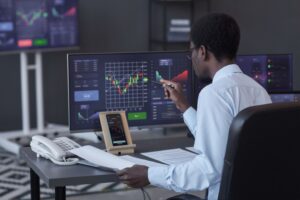Stepping into the forex challenge is a bold move. Some people are lured in by tales of quick wins or the dream of financial freedom. Others begin trading to test themselves or see if they can thrive in fast-moving markets. However, once you start, you quickly realise that learning forex trading is filled with surprises, constant challenges, and lessons that extend far beyond simple numbers.
Trading may be open to everyone, but success in the forex challenge is rare. The markets never play favourites. To survive, each trader must develop real trading skill, learn to adapt, and build a foundation of trading discipline. So, is trading truly the hardest skill to learn? If so, what makes it unique, and how can you prepare for it?
What Makes the Forex Challenge So Unique?
Global Competition Every Day
The forex challenge is unlike anything else in trading or professional skill-building. Every day, you are up against skilled professionals, financial institutions, and advanced trading algorithms. Competition is fierce and ongoing. Staying ahead requires constant improvement of your trading skill and never-ending learning in forex trading.
The Pace and Size of the Market
No other market moves as quickly or is as large as forex. Trillions of dollars are exchanged daily. Prices can shift in a split second due to global news, economic releases, or changes in market sentiment. You must be prepared to react and adapt immediately, as trends may appear and disappear in minutes.
The Impact of Small Mistakes
In forex, tiny errors can lead to significant losses. A delayed reaction or a moment of lost focus may turn a winning trade into a loss. There is little room for hesitation, so decisions need to be made fast and confidently. Here, trading discipline is critical. Every choice matters.
More Than Technical Knowledge
Many believe learning forex trading is all about charts and indicators, but the reality runs deeper. Emotional control is just as important as technical skill. How you respond to sudden market moves often outweighs the strategy you use. The hardest skill to learn is managing yourself—especially sticking to your plan under pressure.
Handling Pressure and Staying Adaptable
Success in the forex challenge requires thriving under pressure and adapting quickly to change. Markets are unpredictable, and your approach must shift just as fast. Resilience and mental agility set professional traders apart. Following your plan during tough moments is the real challenge for most.
The Layers of Trading Skill
Many people think building trading skill is about mastering strategies and recognising patterns. In truth, trading skill is a blend of several elements:
- Analytical ability: Can you read charts and interpret the numbers?
- Decision-making: Do you act with purpose or freeze when the market moves quickly?
- Emotional resilience: Can you accept losses without letting them affect your judgement?
- Risk management: Do you protect your capital with careful planning?
Trading discipline ties these skills together. Without it, even the best strategies fail. The forex challenge reveals every weakness and rewards only those committed to constant improvement.
Trading Discipline in Forex
The world’s top traders have one thing in common: unwavering trading discipline. While it is easy to feel excited after a big win or frustrated by a series of losses, the survivors are those who stick to their rules. The forex challenge is not about a single day’s profit but about how long you can follow your process.
Trading discipline means always setting a stop-loss, never risking more than you can afford, and having a written plan for every trade. It also involves reviewing your performance regularly. In the unpredictable world of forex, discipline is your best defence against chaos.
Learning Forex Trading: A Never-Ending Journey
When you first begin learning forex trading, everything is new. Terms, platforms, and strategies all demand attention. Many traders start with excitement, but only those who treat learning as a never-ending journey move forward. The forex challenge rewards ongoing effort and growth.
Questioning your assumptions, adapting to new trends, and constant study are required. The most successful traders keep journals, analyse past mistakes, and seek out new ideas. Joining trading communities and forums can also deepen your understanding. Over time, learning forex trading becomes a way of life.
Why the Hardest Skill to Learn Isn’t Technical
Emotions Rule the Market
Many believe technical analysis is the toughest part. In reality, the hardest skill to learn is managing yourself. The forex challenge quickly exposes emotions such as fear, greed, and doubt:
- Fear may cause you to exit trades too soon.
- Greed might push you to risk too much after a win.
- Overconfidence leads to ignoring your plan or taking unnecessary risks.
Instant Consequences
Every decision in forex counts. Emotional reactions can turn a good day into a bad one. Hesitation or chasing losses often makes mistakes worse.
Discipline Makes the Difference
True trading discipline involves:
- Spotting your emotional triggers early
- Staying calm and sticking to your plan
- Reviewing trades honestly to improve
Self-control, not just technical skill, is what sets winning traders apart. Masterinig your mindsetedi is the real key to long-term success in the forex challenge.
Training Your Mind
The forex challenge tests your mental strength. When money is at stake, your brain often reacts emotionally. You might see patterns that do not exist or act out of fear. Great traders dedicate time to developing routines that keep them calm and focused.
Using mindfulness techniques, reviewing your progress, and setting simple reminders can help you stay grounded. Without mental strength, trading skill alone is not enough to succeed in the real world.
The Market Is Always Changing
The market never stays the same. Economic cycles, new technologies, and global events constantly shift the landscape. As a result, you must commit to being a lifelong learner.
Learning forex trading in this environment requires ongoing experimentation, testing new ideas, and keeping up with current events. The hardest skill to learn is often the willingness to change and adapt as markets evolve.
Overcoming Setbacks
Facing setbacks is a universal part of every trader’s journey. No matter how skilled or careful you are, there will be days when trades go against you or self-doubt creeps in. The true test of your trading discipline and resilience comes during these difficult times.
What sets winning traders apart is their response to setbacks:
- They see every loss as a lesson, not a defeat.
- Instead of blaming the market, they ask what could have been done differently.
- They review their trading journal to spot mistakes or emotional triggers.
- Winners use setbacks as motivation to refine their strategies and mental approach.
Questions to ask yourself after a setback:
- Was my risk too high for that trade?
- Did I let emotions dictate my actions?
- Did I stick to my trading plan, or did I improvise?
Each honest answer is a step forward. Use these insights to adjust your approach. Maybe your system needs updating, or you need stricter risk limits. Sometimes, it’s simply about taking a break and regaining perspective.
Remember, even professional traders face losing streaks. The forex challenge is not about never falling but always getting back up. Over time, building this resilience and discipline helps transform setbacks into powerful opportunities for growth—both as a trader and as a person.
The Endless Cycle of Improvement
Improvement in trading is never-ending. As your trading skill grows, you realise how much more there is to learn. Markets evolve, your strategies mature, and your mindset must adapt to new challenges.
Ways to keep improving:
- Regularly review your strategies to see what works and what does not.
- Test new systems in a demo account before risking real money.
- Set aside time each week to reflect on your wins, losses, and emotional responses.
- Challenge your own assumptions by studying different trading methods.
Ask yourself:
- Is my trading plan up to date with current market conditions?
- Have I become too attached to a single strategy?
- Am I open to learning from others or exploring new ideas?
True progress comes from humility and a willingness to change. Continuous reflection and learning prevent complacency and keep your edge sharp. Every experience, good or bad, adds to your foundation as a trader.
In the forex challenge, there is always a new level to reach and more skills to refine. The ongoing process of improvement is what turns setbacks into stepping stones, making trading one of the hardest skills to master but also one of the most rewarding.
Steps to Strengthen Your Trading Skill
Mastering the forex challenge takes practice and consistency. Build your trading skill and discipline step by step.
Start with the basics:
- Understand how the forex market works
- Get familiar with common trading terms.
- Practise reading charts and spotting trends.
- Set a risk management rule for every trade.
Build strong routines:
- Write your trading plan and keep it visible.
- Review your plan each morning.
- Keep a journal of your trades and your emotions.
- Look for patterns in your actions after each session.
- Pause when anxious or excited to check if your next move matches your plan.
Stay connected:
- Join trading communities and learn from others.
- Share strategies and progress for added motivation.
Commit to lifelong learning in forex trading. The market changes daily. Stay curious and adapt your approach. Treat every mistake as a lesson for tomorrow.
Why the Forex Challenge Is Worth the Effort
Taking on the forex challenge gives you more than money. The biggest rewards are personal and last a lifetime.
You gain problem-solving skills by analysing markets and making decisions under pressure. Trading builds emotional intelligence, teaching you to manage stress and stay calm. These strengths help you in daily life and any career.
The hardest skill to learn is self-management, but mastering it makes you stronger and more disciplined. The forex challenge teaches you to embrace uncertainty, stay patient through setbacks, and keep improving.
Success is not just about fast profits. It is about steady personal growth and building a mindset ready for any challenge. The discipline and confidence you gain will help you for life.
Conclusion
If you are thinking about the forex challenge, be ready for a demanding, lifelong journey. Trading is not a shortcut to wealth but a process that rewards patience, discipline, and self-improvement.
Treat learning forex trading as a craft. Build your trading skill step by step. Strengthen your trading discipline every day, especially when things get tough.
Trading is often called the hardest skill to learn for good reason. It is a test of your mind, your habits, and your courage to keep going. Those who stick with it, reflect on their progress, and never stop learning will find growth in their trading and themselves.
Read here to learn more about “Opportunity Mindset in Trading: Change Your Trading Journey“

I’m Chaitali Sethi, a financial writer and market strategist focused on Forex trading, market behaviour, and trader psychology. I simplify complex market movements into clear, practical insights that help traders make better decisions and build a stronger trading mindset.




